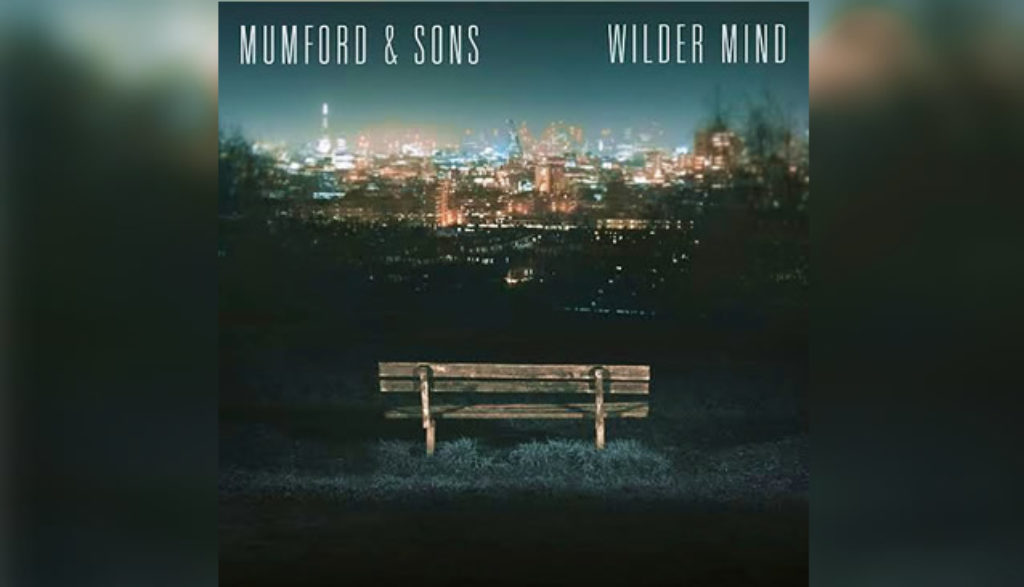
If you followed your sonic seismometer down to the epicenter of the neo-folk earthquake that rumbled through the land just about the time the 2010s got underway, you’d find Marcus Mumford and his band stomping away with their big rhythmic roots boots. But even though Mumford & Sons sparked a revival that’s since rippled far and wide across the music scene, the band’s apparently grown a bit weary of the trend it popularized.
Which is why on the British group’s third album, the brooding Wilder Mind, trademark banjos ‘n’ accordions have been exchanged for moody, electrified atmospherics much more in the vein of U2, Coldplay and Kings of Leon.
Guitarist Winston Marshall recently said the stylistic change was motivated by the need to do something different. “I don’t think [Wilder Mind] is a reaction to what anyone else thought,” he told vulture.com’s Lauretta Charlton. “It was a reaction against the fact that we’d done six or seven years of touring with four instruments that largely weren’t our first instruments. … By the end of that, we were desperate to play something else, to do anything new.” The result, as Charlton put it, is an “album [that] does not sound like it could’ve been recorded during the Great Depression.”
And in significant thematic ways, it doesn’t sound much like the band’s first two albums either.
“The Wolf” finds a man trying to convince a gun-shy woman of his sincerity: “Hold my gaze, love/You know I won’t let it go/We will stare at the wonder of it all.” He also counsels, “Leave behind your wanton ways,” and promises, “I want to learn to love in kind/’Cause you are all I ever longed for.” There’s something similar on “Broad-Shouldered Beasts,” where a man tells his fragile, fearful partner, “When you feel the world wrapping around your neck/Feel my hand ’round yours/ … Don’t succumb.”
Online commenters have said vague lines on “Hot Gates” about blades and loneliness are suicide references: “Even in the dark I saw you were the only one alone/ … Near a duller blade, a promise out of sight.” If that interpretation is accurate, the band seemingly rejects suicide as a way out, exhorting, “And though we cry, we must stay alive/Let my blood run out when the world decides/There is no way out of your only life/So run on, run on.” Amid loneliness and desperation (“Alone again/And I hunger and I thirst”), a man clings to hope (“Didn’t they say that only love will win in the end?”). The track also admits, “And I can’t be for you all the things you want me to,” yet vows, “But I will love you constantly.”
On “Tompkins Square Park,” an unfaithful guy who’s just told his beloved he’s leaving her still asks for another interlude (“I wanna hold you in the dark/One last time”). He justifies his departure by saying, “No flame burns forever, oh no/You and I both know this all too well.” It’s a mournful, morose song, and there are more where it came from …
“Cold Arms” concludes with a disturbing portrait of a lifeless, hopeless, fear-filled relationship. “Monster” comments suggestively on a woman’s appearance (“Yours is the face which makes my body burn”), then spits bitterly, “Curse the beauty, curse the queen/Curse the beauty, leave me/ … In our bedroom we’re bloodshot and beat/And never so alive/ … Now look at you, all torn up/I left you waiting to bleed.” The monstrous conclusion? “I guess the truth works two ways/Maybe the truth’s not what we need.” Loss and relational dissolution fill “Ditmas” too.
Distrust counterintuitively drenches “Believe.” And lifelong love on the title track proves elusive for a couple still sharing a bed but separated by jagged emotional distance. We hear a similar lament on “Just Smoke” (“Why do I keep failing? I thought we were done/Why do I keep failing? And your love would keep us young”). Elsewhere Marcus Mumford admits he can’t commit (“I’m not ready, I’m not strong enough/To cradle the weight of your love”) and that he holds no words of hope or comfort.
“Monster” slips in an obscenity with the line, “So f— your dreams/And don’t you pick at our seams/I’ll turn into a monster for you.”
Allmusic.com reviewer Stephen Thomas Erlewine writes, “Now that everybody else sounds like Mumford & Sons, Mumford & Sons decide to sound like everybody else.” And though he’s talking about the band’s sound, it’s a statement equally true of the lyrical trajectory on Wilder Mind.
Mumford & Sons’ first two albums were among the more spiritually observant “secular” albums in the last decade, grappling with the big issues of sin, failure, grace, forgiveness and redemption. There’s definitely failure here and isolated moments of (romantic) grace. But more often than not, Marcus Mumford has now decided to veer in a darker, more melancholy direction. Eight of 12 songs drearily unpack emotional loss in dead or dying relationships, leaving the overall feel a grim one. So grim and despondent, in fact, that after listening I actually went online to find out if Mr. Mumford was going through a divorce with his wife, actress Carey Mulligan. He’s not. But you, too, would be forgiven for thinking so after listening to his music.
Certainly brokenness and struggle are integral parts of life. But Wilder Mind’s fixation on failure often fails to turn the kind of redemptive and perspective-providing corner that so marked Mumford & Sons’ previous work.

After serving as an associate editor at NavPress’ Discipleship Journal and consulting editor for Current Thoughts and Trends, Adam now oversees the editing and publishing of Plugged In’s reviews as the site’s director. He and his wife, Jennifer, have three children. In their free time, the Holzes enjoy playing games, a variety of musical instruments, swimming and … watching movies.